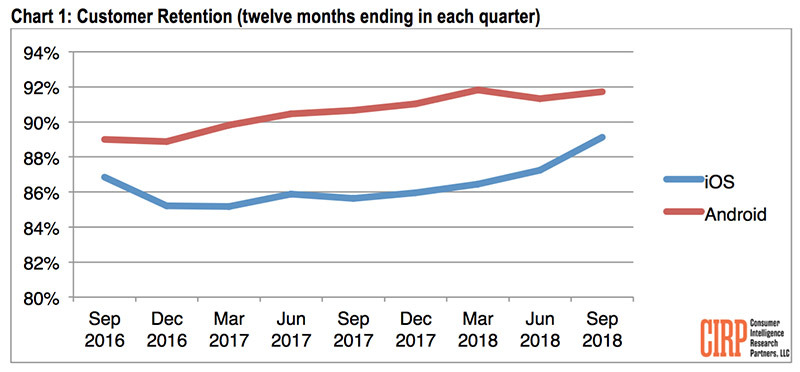Apple's iOS is catching up to Google's Android in terms of customer loyalty, continuing a three-year trend that has seen both operating systems enjoy extremely high retention rates, according to a research report published Thursday.
Citing fresh polling data, Consumer Intelligence Research Partners reports iOS loyalty rates hit a high of 89 percent during the three months ending in September. That compares to a 92 percent loyalty rate for Android over the same period.
CIRP surveyed 500 people in its quarterly survey. Loyalty was measured as the percentage of users who remain with a particular operating system when activating a new phone over a trailing year.
From September 2016 through September 2018, Android loyalty plotted at between 89 and 92 percent. Over that same period, iOS loyalty was between 85 to 89 percent, CIRP says.
The latest results represent new highs for both platforms, and arrive as Apple and Google vie for users in an increasingly saturated smartphone market.
"Loyalty has crept up for both iOS and Android in the past two years, to the highest levels we've seen," said Mike Levin, partner and co-founder of CIRP. "Basically, For the past three years, around 90 percent of US smartphone users remain with their same operating system when they buy a new smartphone."
Apple over the past few quarters has put a focus on so-called "switchers" as it seeks new avenues of growth in developed markets. A CIRP analysis in June found roughly 20 percent of new iPhone users came from the Android camp, though many switchers at the time were electing to enter Apple's ecosystem through cheaper handsets like iPhone SE.
"Over time we've seen analysis that predicts OS switching, particularly from Android to iOS, will increase going forward," said Josh Lowitz, partner and co-founder of CIRP. "That's absolutely possible, but it would represent a significant change from the long-term trend. These analyses are based asking what consumer plan or intend to do, which as we know is highly subjective and often more aspirational than realistic."
It appears both Apple and Google have their work cut out for them as consumers in relatively mature markets become further entrenched in the ecosystems of their respective OS of choice.
"In the past two years we've seen loyalty rates of iOS and Android begin to converge," Levin said. "While the data indicates Android has a slighly [sic] higher loyalty rate, iOS has narrowed what was a small gap to begin with, to the point that both enjoy approximately the same, very high loyalty."
 Mikey Campbell
Mikey Campbell







-m.jpg)






 Charles Martin
Charles Martin

 Malcolm Owen
Malcolm Owen
 William Gallagher
William Gallagher

 Christine McKee
Christine McKee
 Wesley Hilliard
Wesley Hilliard








38 Comments
Is mobile operating system loyalty even a thing? The Android market is flooded with countless numbers of products from a sea of vendors at every imaginable price point and quality level. iOS is single vendor, single brand, and single product line. I personally think this measure from CIRP is total crapola. Let’s see brand loyalty, Apple versus every other brand standing on its own. Comparing one Apple to a sea of Oranges is totally bogus.
I think Google’s “loyalty” could be reread as, “cheap people are still cheap, some are now aware they use Android.”
When you ask all but the geekiest of Android users why they don’t have an iPhone nine times out of ten they say iPhones are too expensive. And the timed they don’t it’s normally something stupid like, “my friend says it’s better” or “I had an iPhone and the screen broke.” (Typically their android phone is already broken.)
How do they reconcile these loyalty numbers with customer satisfaction (where Apple routinely scores at the top)?